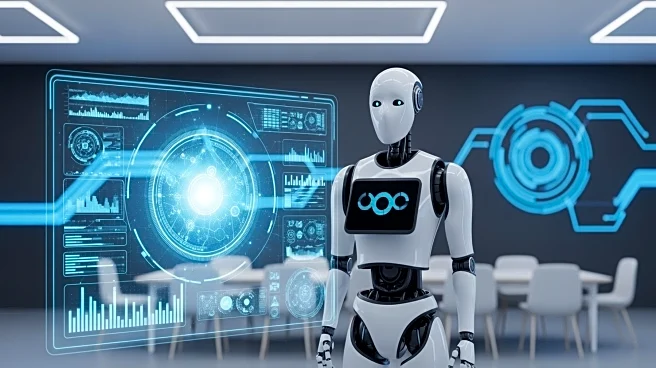What's Happening?
A panel discussion at the TIME100 Impact Dinner in San Francisco focused on the transformative effects of artificial intelligence on business. Moderated by TIME's executive editor Nikhil Kumar, the panel included
Ravi Kumar S, CEO of Cognizant; Athina Kanioura, chief strategy and transformation officer at PepsiCo; and Jared Kaplan, co-founder and chief science officer at Anthropic. The discussion highlighted AI's role in automating tasks and enhancing productivity, with PepsiCo training all 320,000 employees in AI. Cognizant's Kumar noted that AI could drive upward social mobility by increasing entry-level job opportunities, while Kaplan emphasized the importance of regulation to ensure AI's safe integration into business practices.
Why It's Important?
The integration of AI into business processes is significant as it promises to enhance productivity and innovation across industries. Companies like PepsiCo are leveraging AI to streamline operations and improve employee experiences, potentially setting a precedent for other corporations. Cognizant's approach suggests a shift in job dynamics, with entry-level positions becoming more prevalent, which could impact employment patterns. The discussion also underscores the need for regulatory frameworks to mitigate risks associated with AI, ensuring its safe and effective use. This could influence policy-making and business strategies, affecting stakeholders across the economic spectrum.
What's Next?
As AI continues to evolve, businesses are likely to further integrate AI technologies into their operations, potentially leading to more widespread adoption across various sectors. Companies may focus on developing interdisciplinary skills among employees to adapt to AI-driven changes. Policymakers might consider implementing more comprehensive regulations to address AI's risks and benefits, influencing how businesses deploy these technologies. The panelists' insights suggest ongoing advancements in AI could lead to significant shifts in business models and employment structures, with potential implications for global food systems and scientific research.
Beyond the Headlines
The ethical implications of AI in business are profound, as companies must balance technological advancements with workforce impacts. The potential for AI to democratize expertise and enhance scientific research could lead to long-term shifts in innovation and knowledge dissemination. Additionally, the focus on regenerative agriculture and sustainable practices highlights AI's role in addressing environmental challenges, which could influence corporate social responsibility initiatives. These developments may reshape cultural and ethical norms within industries, prompting discussions on the responsible use of AI.










